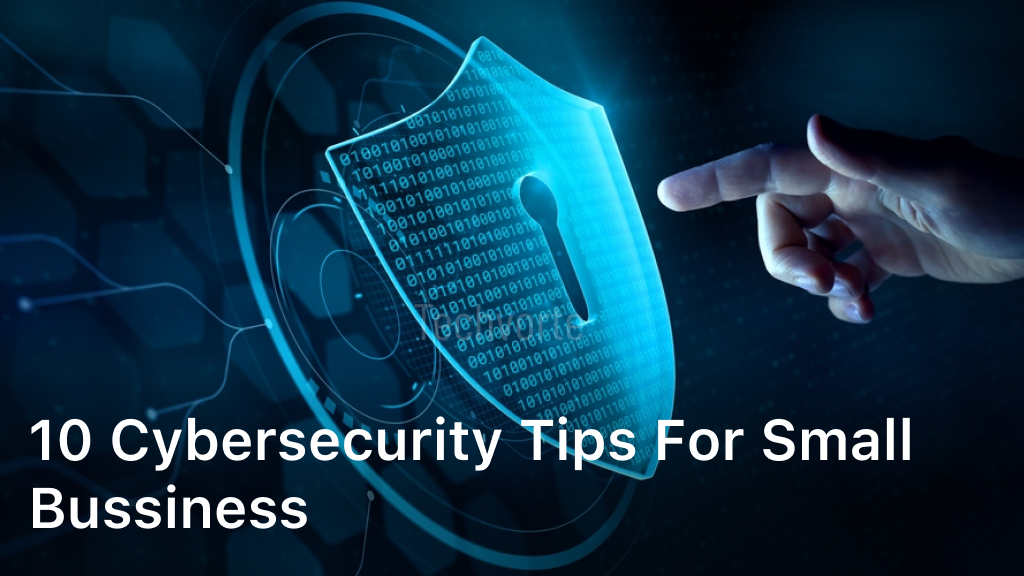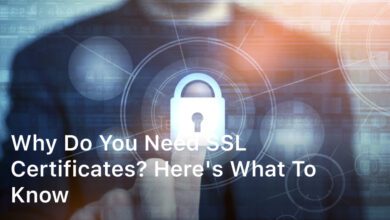In today’s digital age, cybersecurity is of utmost importance for businesses of all sizes.
However, small businesses are often more vulnerable to cyber threats due to limited resources and expertise.
Implementing effective cybersecurity measures can safeguard your business’s sensitive information and reputation.
Here are ten essential cybersecurity tips tailored specifically for small businesses.
Regular Software and Patch Updates
Keeping your software and applications up to date is crucial to ensure that vulnerabilities are patched and your systems are protected against the latest cyber threats.
Regular software updates provide essential security enhancements, bug fixes and improved functionality to safeguard your small business from potential security breaches.
Software developers constantly monitor and address security vulnerabilities.
By installing the latest updates and patches, you can protect your business data and sensitive information from emerging threats.
These updates often include important security fixes that address known vulnerabilities, strengthening your business’s defenses against cyberattacks.
Here are some reasons why regular software and patch updates should be an integral part of your small business’s cybersecurity strategy:
- Improved Security: Regular updates help to eliminate vulnerabilities that hackers might exploit to gain unauthorized access to your systems. By staying up to date, you ensure that your software is equipped with the latest security measures.
- Bug Fixes and Performance Enhancements: Updates not only address security issues but also fix software bugs and improve overall performance. This allows your employees to work more efficiently and reduces the possibility of system crashes or errors.
- Compatibility: Software updates often include compatibility improvements, ensuring that your applications work seamlessly with other software and hardware components. This helps to avoid potential conflicts that can jeopardize your business operations.
- Vendor Support: By regularly updating your software, you can take advantage of ongoing technical support from the software vendor. This support can be vital in resolving any issues or concerns that may arise during your business operations.
Remember, cyber threats are evolving constantly and hackers are continually searching for new vulnerabilities and exploits.
Regularly updating your software and applying patch updates is a simple yet effective way to stay one step ahead of cybercriminals and protect your small business from potential security breaches.
Train Employees
Educating your employees about cybersecurity best practices is essential in today’s digital landscape.
As they often serve as the first line of defense against cyber attacks, equipping them with the right knowledge and skills can significantly enhance your business’s cybersecurity posture.
1. Create a Cybersecurity Training Program
Develop a comprehensive training program that covers various cybersecurity topics, such as identifying phishing emails, using strong passwords and recognizing social engineering tactics.
Incorporate interactive elements, such as quizzes and simulations, to actively engage your employees.
2. Foster a Culture of Cybersecurity Awareness
Encourage a culture where employees prioritize cybersecurity by emphasizing the importance of their role in protecting sensitive information.
Regularly communicate cybersecurity policies, share real-world examples of cyber threats and highlight the potential consequences of a breach.
3. Provide Regular Updates and Refreshers
Cybersecurity threats evolve rapidly, so it’s crucial to provide regular updates and refreshers to ensure your employees stay informed and up to date.
Distribute newsletters, conduct workshops and organize webinars on the latest cybersecurity trends and best practices.
4. Conduct Simulated Phishing Campaigns
Simulated phishing campaigns can help assess your employees’ vulnerability to phishing attacks.
By sending out mock phishing emails, you can identify areas for improvement and provide additional training where necessary.
5. Establish Clear Reporting Procedures
Create a clear and easy-to-follow procedure for reporting security incidents or suspicious activities.
Encourage employees to report any potential threats promptly, fostering a collaborative environment that emphasizes the importance of early detection and response.
- Train employees in the basics of cybersecurity awareness
- Create a cybersecurity training program
- Foster a culture of cybersecurity awareness
- Provide regular updates and refreshers
- Conduct simulated phishing campaigns
- Establish clear reporting procedures
Passwords and Authentication

When it comes to protecting your business accounts, implementing strong passwords and multi-factor authentication is crucial.
These security measures provide an additional layer of defense against unauthorized access and help safeguard your sensitive information.
Create Strong Passwords
One of the first steps in enhancing your password security is to create strong, unique passwords.
Avoid using common words or personal information that can be easily guessed.
Instead, opt for complex combinations of uppercase and lowercase letters, numbers, and symbols.
Remember to use different passwords for each of your accounts to minimize the potential damage if one password is compromised.
Consider using a password manager tool to securely store and generate strong passwords.
Implement Multi-Factor Authentication
Multi-factor authentication (MFA) adds an extra layer of protection by requiring users to provide multiple forms of verification before accessing an account.
This typically involves a combination of something you know (password), something you have (mobile device) or something you are (biometric data).
By enabling MFA, even if a password is stolen or compromised, the attacker would still need the additional verification factors to gain access.
This significantly reduces the risk of unauthorized access to your business accounts.
Regularly Update and Rotate Passwords
In addition to creating strong passwords, it is essential to regularly update and rotate them.
Set a reminder to change passwords every few months and ensure that all employees follow this practice.
By regularly updating your passwords, even if a breach occurs, the stolen passwords will quickly become outdated and less valuable to attackers.
- Use a combination of uppercase and lowercase letters, numbers, and symbols.
- Create unique passwords for each account.
- Consider using a password manager tool to generate and securely store passwords.
- Enable multi-factor authentication to add an extra layer of security.
- Regularly update and rotate passwords to mitigate the risk of compromised accounts.
By following these password security best practices, you can significantly enhance the security of your business accounts and protect your sensitive data from unauthorized access.
Timely Risk Assessments
Conducting regular risk assessments is a critical component of a robust cybersecurity strategy for your small business.
By identifying potential vulnerabilities, you can proactively implement effective measures to mitigate them and protect your valuable assets.
Why Risk Assessments Matter
Risk assessments allow you to take a comprehensive look at your business’s cybersecurity posture.
By conducting thorough evaluations of your systems, networks and processes, you can gain insights into potential weaknesses that could be exploited by cybercriminals.
With the ever-evolving nature of cyber threats, it’s crucial to conduct risk assessments regularly.
This ensures that you stay ahead of new vulnerabilities and can implement appropriate countermeasures promptly.
The Risk Assessment Process
When performing a risk assessment, consider the following steps:
- Identify assets: Determine the critical assets that need protection, such as customer data, financial information, or intellectual property.
- Analyze threats: Assess the potential threats that could compromise these assets, including external attacks, insider threats, or natural disasters.
- Evaluate vulnerabilities: Identify weaknesses in your systems, processes, or personnel that could be exploited by attackers.
- Assess risks: Determine the level of risk associated with each vulnerability and prioritize them based on the potential impact on your business.
- Implement controls: Develop and implement cybersecurity controls and countermeasures to mitigate identified risks.
- Monitor and review: Continuously monitor the effectiveness of your controls and regularly review and update your risk assessment to adapt to evolving threats.
Benefits of Timely Risk Assessments
By conducting risk assessments on a regular basis, you can:
- Stay proactive: Identifying vulnerabilities in advance allows you to take preventive measures to protect your small business from cyber threats.
- Reduce potential impacts: By addressing potential risks proactively, you can minimize the potential financial and reputational damage caused by successful cyber attacks or data breaches.
- Comply with regulations: Conducting regular risk assessments helps ensure that your business adheres to relevant industry regulations and compliance requirements.
- Enhance cybersecurity awareness: The risk assessment process fosters a culture of cybersecurity awareness among your employees, making them more vigilant and proactive in combating cyber threats.
Remember, cybersecurity is an ongoing process and regular risk assessments are crucial to maintaining the protection of your small business against evolving cyber threats.
Use Virtual Private Networks (VPNs)
When it comes to securing your small business’s network infrastructure and protecting sensitive data, using a Virtual Private Network (VPN) is a smart choice.
A VPN creates a secure, encrypted connection between your devices and the internet, ensuring that your online communications are safe from prying eyes.
One of the primary benefits of using a VPN is that it offers an additional layer of security when accessing the internet.
By diverting your network traffic through a VPN server, your business’s data is shielded from potential threats, such as hackers or surveillance.
A VPN also allows you to establish secure connections when using public Wi-Fi networks, which are notorious for their lack of security.
By encrypting your internet traffic, a VPN prevents anyone on the same network from intercepting your data or gaining unauthorized access to your business accounts.
Moreover, VPNs provide small businesses with the flexibility to access geographically restricted content and websites.
By connecting to servers located in different countries, you can bypass online censorship and expand your business’s reach globally.
When choosing a VPN for your small business, consider factors such as encryption protocols, server locations, connection speed and user-friendly interfaces.
It’s also essential to opt for reputable VPN providers that prioritize user privacy and have a track record of maintaining secure networks.
In conclusion, using a VPN is an effective way to safeguard your small business’s network infrastructure, ensuring secure communication and protecting sensitive data while accessing the internet.
By incorporating VPN technology into your cybersecurity strategy, you can significantly reduce the risk of cyber threats and maintain the confidentiality of your business information.
Regular File Backups
Regularly backing up your business files is an essential practice that ensures the protection of your valuable data.
In the event of a cyber attack or system failure, having a reliable backup strategy can be a saving grace.
Implementing an effective file backup strategy involves several key considerations:
- Choose a backup solution: Look for a cloud-based backup service or an external hard drive that meets your business’s needs. Assess factors such as storage capacity, ease of use, and security features.
- Automate backups: Set up automated backups to ensure that your files are regularly backed up without manual intervention. This minimizes the risk of forgetting or neglecting the backup process.
- Select critical files: Identify and prioritize the most important files and data that are crucial for your business operations. Focus on financial records, customer information, and other vital documents.
- Test your backups: Periodically test your file backups to ensure that they are functioning properly. This includes checking the restoration process and verifying the integrity of the backed-up data.
- Store backups securely: Safeguard your backups by storing them in a secure location, separate from your primary systems. Consider utilizing encryption and access control measures to protect sensitive information.
By following these tips, you can create a robust file backup system that provides peace of mind, knowing that your business’s critical data is protected.
Remember, file backups are an indispensable component of data protection for small businesses.
Deploy Antivirus
Antivirus software plays a vital role in safeguarding your small business’s cybersecurity infrastructure.
It serves as a crucial barrier against cyber attacks, preventing unauthorized access and protecting valuable data.
By deploying antivirus software, you can establish a robust defense system that continuously monitors and scans your systems for malicious activities.
It identifies and removes viruses, malware and other potential threats that can compromise your business’s sensitive information.
Choosing the right antivirus solution for your needs is essential.
Consider factors such as the software’s effectiveness, ease of use and compatibility with your operating systems.
Here are key benefits of deploying antivirus software:
- Real-time protection: Antivirus software actively scans for and blocks threats in real-time, ensuring that your systems are protected at all times.
- Preventing data breaches: By detecting and eliminating malware and viruses, antivirus software minimizes the risk of data breaches and helps preserve your customers’ trust.
- Safe web browsing: Antivirus software can provide web protection, blocking malicious websites and preventing employees from inadvertently downloading harmful content.
- Regular updates: Antivirus software regularly updates its virus definitions to stay up to date with emerging threats, ensuring that your systems are prepared to combat new cyber attacks.
Remember, antivirus software is not a one time solution, it requires regular updates and maintenance.
Stay proactive in keeping your software current to maximize its effectiveness.
Secure Your Wi-Fi Networks
When it comes to safeguarding your business information, securing your Wi-Fi networks is of utmost importance.
By taking the necessary steps to protect your Wi-Fi, you can prevent unauthorized access and keep your valuable data safe.
Here are some tips to help you secure your Wi-Fi networks effectively:
- Change Default Passwords: Start by changing the default password for your Wi-Fi router. Using a unique, strong password will make it harder for hackers to gain access to your network.
- Enable Network Encryption: Enable network encryption, such as WPA2 or WPA3, to encrypt the data being transmitted over your Wi-Fi networks. This ensures that even if someone intercepts the data, they won’t be able to decipher it without the encryption key.
- Hide your SSID: Consider hiding your network’s Service Set Identifier (SSID) to make it less visible to outsiders. This adds an extra layer of protection by making it harder for unauthorized users to find and connect to your Wi-Fi network.
- Use a Firewall: Deploy a firewall to protect your Wi-Fi network from unauthorized access and potential attacks. A firewall acts as a barrier between your internal network and the internet, filtering out malicious traffic and keeping your data secure.
- Implement MAC Address Filtering: MAC Address Filtering allows you to specify which devices can connect to your Wi-Fi network by filtering them based on their unique MAC addresses. This helps ensure that only authorized devices can access your network.
By following these tips, you can strengthen the security of your Wi-Fi networks and safeguard your business information from potential threats.
Remember, Wi-Fi security is an ongoing process, so regularly review and update your security measures to stay one step ahead of cybercriminals.
Limit Physical Access to Computers
When it comes to protecting your small business from cyber threats, it’s not just virtual security measures that matter. Physical security also plays a crucial role in safeguarding your sensitive information and data. By limiting physical access to computers and network infrastructure, you can prevent unauthorized individuals from tampering with your systems and potentially causing significant damage.
Here are some essential tips to ensure physical security in your small business:
- Lock your office or server room: Always keep your office or server room securely locked, limiting access to only authorized personnel.
- Implement access controls: Use key cards, biometric systems, or other access control measures to restrict entry to sensitive areas.
- Secure laptops and mobile devices: Encourage employees to lock away laptops and mobile devices when not in use, especially in public spaces or during off-hours.
- Label and track equipment: Clearly label all computers, servers, and other devices with unique identifiers to help monitor and track their whereabouts.
- Secure wiring closets: Ensure that wiring closets and network infrastructure are properly secured and inaccessible to unauthorized individuals.
- Dispose of electronic devices securely: When disposing of old computers or other electronic devices, make sure to wipe the data and physically destroy the storage media.
By implementing these physical security measures, you can significantly reduce the risk of unauthorized access to your business’s computers and network infrastructure.
Remember, both virtual and physical security measures go hand in hand to ensure comprehensive protection against cyber threats.
Conclusion
Protecting your small business from cyber threats and data breaches should be a top priority.
By implementing the cybersecurity tips outlined in this article, you can safeguard your business’s sensitive information and reduce the risk of falling victim to cyber attacks.
Regular software and patch updates are crucial to ensure that your systems are protected against the latest vulnerabilities and threats.
Additionally, training your employees about cybersecurity best practices will help create a more cyber-aware workforce.
Strong passwords and multi-factor authentication add an extra layer of security to your business accounts, while timely risk assessments allow you to identify and mitigate potential vulnerabilities.
Using virtual private networks (VPNs) when accessing the internet helps secure your network communications and protect your data.
Regular file backups ensure that you have a copy of your crucial business data in case of a cyber attack or system failure.
Deploying antivirus software and securing your Wi-Fi networks are also essential in preventing unauthorized access to your data.
Finally, by limiting physical access to your computers and network infrastructure, you can further strengthen your small business’s cybersecurity defenses.
Remember, implementing these cybersecurity tips will help keep your business safe in the ever-evolving digital landscape.
FAQ
Why is it important to regularly update software and patches?
Regular software and patch updates help protect your systems by patching vulnerabilities and addressing the latest cyber threats.
How can I train my employees to be more cyber-aware?
Educate your employees about cybersecurity best practices through training programs and workshops.
How can I create and manage secure passwords?
Implement strong passwords and consider using multi-factor authentication for added security.
What is the significance of conducting regular risk assessments?
Timely risk assessments help identify vulnerabilities and develop effective cybersecurity strategies to mitigate them.
How can a VPN benefit my small business?
Using a Virtual Private Network (VPN) helps secure network communications and protects sensitive business data when accessing the internet.
Why should I regularly back up my business files?
Regularly backing up your files ensures that you have copies of crucial data in case of a cyber attack or system failure.
Why is antivirus software important for small businesses?
Antivirus software is a critical component of your cybersecurity infrastructure, helping prevent and detect cyber attacks.
How can I secure my Wi-Fi networks?
Ensure Wi-Fi security by using strong passwords, enabling encryption, and regularly updating router firmware.
Why is physical security important for small businesses?
Restricting physical access to computers and network infrastructure prevents unauthorized individuals from tampering with your systems.





